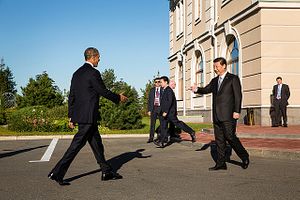U.S. President Barack Obama recently commented on Chinese president Xi Jinping, saying that he was impressed by Xi’s quick consolidation of power. Obama also referred to Xi as the strongest leader in China since Deng Xiaoping. In making this comment, Obama probably was also thinking about his own position within the U.S. political structure, particularly after his Democratic Party suffered a landslide loss in the midterm elections, thus rendering him a lame duck president before his term ends in 2016. Was Obama even a bit jealous of Xi’s strong power position? We do not know, but it would be interesting to compare the effectiveness of the two leaders and ponder the implications thereof for Sino-U.S. competition at the global level in coming years.
If we look at what the two leaders have accomplished so far, then the clear winner is Xi Jinping. In a short span of two years, Xi Jinping has arguably accomplished far more than what Obama has accomplished in his six-year term. While Obama’s main achievements since 2009 have been limited to his health care reform, Xi’s achievements have included the anti-corruption campaign, hukou reform, legal reforms, higher-education reform and so on, pretty much covering all important areas in China.
So why this huge contrast between the two national leaders? There could be two reasons why Xi is more effective than Obama is.
The first reason has something to do with the differences between the overall political structures in China and the United States. In this sense, it could be argued that the Chinese system is more effective than the U.S. system is. Actually many analysts in the U.S. recognize some benefits of the Chinese system. For example, the famous columnist Thomas Friedman once said that the U.S. system is a “one-party democracy” and it should “be China for a day” in order to solve many of the problems it faces. Renowned political theorist Francis Fukuyama also agreed that China’s bureaucratic system is a high-quality one. Indeed, within a short span of six years, China has built the largest system of high-speed rail line in the world. In contrast, California’s high-speech rail line will start operating as early as 2029, if everything goes as planned.
Xi having richer governance experience is the second reason why Xi is a more effective leader. Before becoming China’s top leader, Xi Jinping spent about 40 years in various areas in China, ranging from poor parts of the county like Zhengding in Hebei province to rich mega-cities like Shanghai. In contrast, Obama’s lack of a long political record might have enabled him to win the presidential election in 2008, but it has not helped his governance record between 2009 and 2014. Obama’s foreign policy has been widely viewed as weak, and Dick Cheney even called Obama a “very, very weak president.” To be fair, though, Obama has been frustrated by political polarization in the U.S. system, and the recent mid-term election failure on the part of his Democratic Party only makes it harder for him to lead effectively. Still, Obama’s lack of real governance experience before becoming president might explain his many policy failures. After all, being a national leader is very different from being a senator who just needs to win the approval of one state’s population.
If Xi indeed is a more effective leader than Obama, then the interesting question is how this will affect competition between China and the U.S. in coming years. Although the U.S. will have a new president in 2016, it is possible that no matter who the new leader is, she or he will suffer the same problems that have plagued the Obama administration. And Xi Jinping will not retire until 2022. Given Xi’s strong leadership and mature political skills, is the U.S. president ready to compete?
This is no small issue in international politics, though many scholars and analysts would argue that international system matters more than individual leaders or personalities. It is probably true that individual leaders are unable to reverse historical trends, but leaders can delay, transform, or quicken the trends. All other things being equal, having a strong leader definitely helps when it comes to international competition with another. It is time for the U.S. to realize this important point.

































